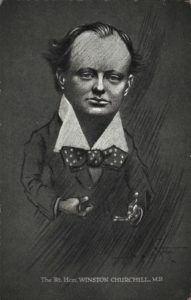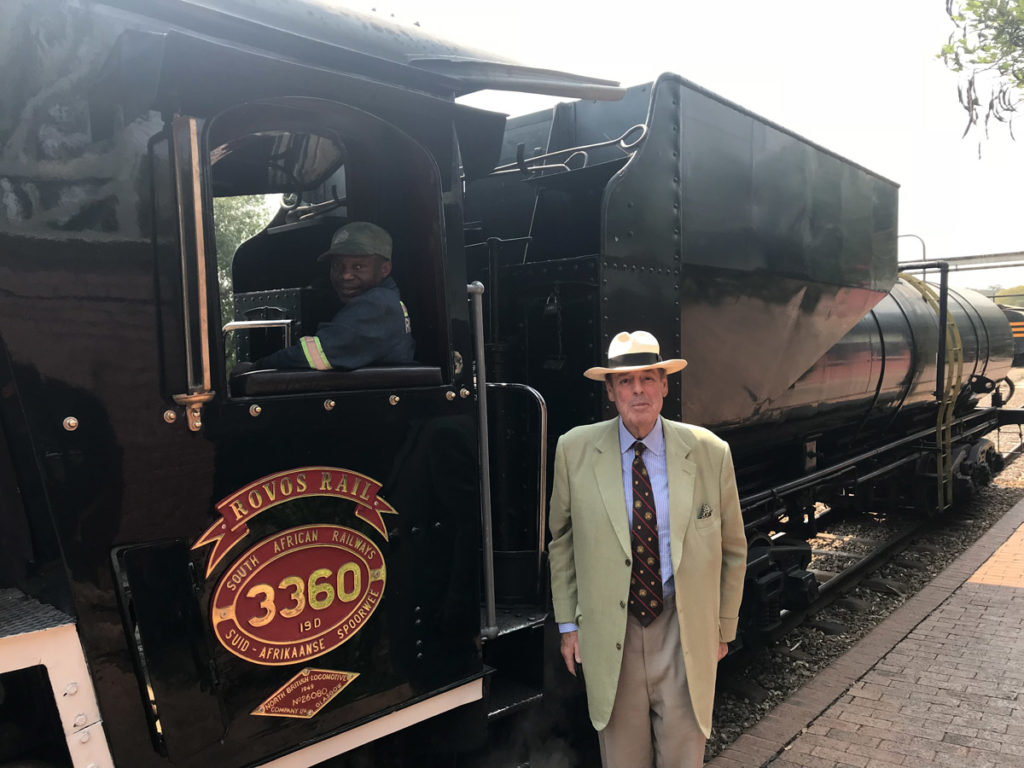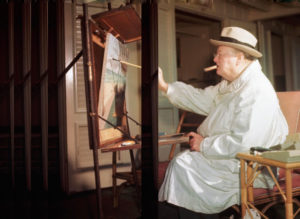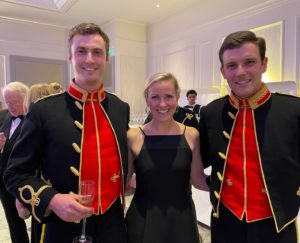
Bulletin #161 — Nov 2021
Travel to South Africa with Sir Winston Churchill’s grandson, Sir Nicholas Soames MP

Sir Nicholas Soames in South Africa
October 30, 2021
In March 2022, Sir Winston Churchill’s grandson, Sir Nicholas Soames, will be leading a small group trip to South Africa. This journey will take one of the world’s most luxurious trains deep into the heartlands of the Boer War, following in the footsteps of Sir Winston Churchill. Sir Nicholas is a fantastic storyteller, who will regale guests with tales of his grandfather and bring the Boer battlefields to life. The trip has been carefully designed and created by the experts at owner-run specialist travel company, cazenove+loyd.
We spoke to Sir Nicholas and Christopher, Co-Owner + Director of cazenove+loyd, to find out more about this fantastic journey and why they are so excited:
What are you most looking forward to?
Sir Nicholas Soames: I am excited about the carefully planned routing of this trip, as it really does follow in Churchill’s footsteps. It will be a stirring experience to trace all of his exploits in the Boer War and to be able to share the side of my grandfather I knew with my fellow travellers.
I’m also very much looking forward to returning to being hosted by the Rattray family at Rorke’s Drift and Isandlwana. Last time I was there, I met with owner and celebrated historian David Rattray, who bowled me over with his fantastic story-telling surrounding the Anglo-Zulu Wars. It will be fantastic to see how his legacy is continued by his wife Nicky and sons Andrew, Douglas and Peter and to hear them tell those emotionally charged accounts passed down by their father.

2025 International Churchill Conference
Why is the trip so special?
Christopher Wilmot-Sitwell: We designed a similar trip to this one in 2018, which quickly filled up and was a huge success, so we are thrilled to be offering another amazing rail journey through South Africa. The itinerary has been meticulously refined and developed, delving into South Africa’s fascinating past through the Anglo-Zulu and subsequent Boer Wars while giving our guests a real understanding of the country in the present day. Every element is designed to be educational, exciting and, above all, extraordinary and we have secured unparallelled private access to ensure that it exceeds every expectation.
We will be joined by some of the very best speakers on the subjects of the Anglo-Zulu Wars and the Boer War to help us tell the moving stories from the battlefields. This journey will provide a matchless insight into the Boer War, taking in unexplored corners of battlefields, which will be put into exhilarating context by Sir Nicholas Soames and Rovos Rail’s historical consultant, Nicholas Schofield.
Our long-standing relationship with the Rattray family means we also have special access at Rorke’s Drift and Isandlwana – the sites of two major battles of the Anglo-Zulu War of 1879. Guests will spend a day here hosted and guided by the Rattray family who will take them to where Lieutenants Melvill and Coghill lost their lives attempting to save the Queen’s Colour of their regiment, the 24th Regiment of Foot. Listening to their immersive talks is an extremely thought-provoking and emotionally charged experience, which will leave guests with a new connection to the Anglo-Zulu wars and South African history as a whole. On the 2018 trip, hearing Douglas Rattray recount the heroics of Rorke’s Drift against the little building where so many fought and died was as moving as it gets. I looked around my fellow listeners and there was not a dry eye in sight.
Why is travelling onboard Rovos Rail so unforgettable?
Christopher Wilmot-Sitwell: The glamorous Rovos Rail train has been exclusively chartered for guests of cazenove+loyd. Along the way, days are spent exploring what can be called the real, unmanicured South African bush and evenings are spent enjoying exquisite silver service dining on what is one of the world’s most luxurious trains. Many of the Zulu and Boer battlefields lie in totally unspoilt parts of South Africa, where plains game gallop untroubled by many vehicles or structures and the settings of the conflicts remain largely unchanged.
What stands out for you on this trip?
Christopher Wilmot-Sitwell: Every day will be a revelation and guests will no doubt feel incredibly privileged and blessed to be seeing it all from a private train and with the first-hand research of historian Nicholas Schofield and the personal anecdotes of Churchill’s grandson to hand. When we first called our trip ‘In the footsteps of Sir Winston Churchill’, I didn’t visualise parking up our train and planting my own feet in the place on the track where Churchill was ambushed by the Boers in 1899. History would have been very different if the ambush had turned out differently and, seeing the location from which the Boers attacked, it is amazing that he was taken alive. Nicholas Schofield gained access for us to the Department of Education Building and Library, where Winston Churchill was imprisoned and from where he escaped. It was one of the goosebumps moments of the trip.
How do you think that Sir Winston Churchill’s time in South Africa influenced his later career, and is there a particular instance which demonstrates this?
Sir Nicholas Soames: I feel very strongly that much of my grandfather’s life was shaped by his time in South Africa, in particular when he was captured by the Boers and later made his escape. So much of who he was and who he was to become came through at this moment of great danger and personal desperation. I believe that much of Churchill’s audacity and courage (and his drive and ambition) comes to light in his experiences as a young man in Africa. These characteristics are what made him into the national hero that he later became.
I think we have to look closely at his capture and subsequent escape in particular. Despite the fact that Churchill was technically a civilian (as he had been working as a journalist), he was treated as a prisoner of war by the Boers. He was taken to Pretoria and imprisoned with British officers but he soon became restless and made plans to escape, which demonstrates the maverick quality that is so familiar to people. He initially planned a mass breakout but soon realised that it was impractical and began to collude with two other officers to escape. He closely monitored the Boer guards and saw a gap in their routine when no one was watching the 10ft wall that surrounded the camp.
After four weeks, he made his bid for freedom at night by waiting for the gap to appear and silently scaling the wall. This was only the beginning of his daring escape, but this dramatic snapshot embodies all the characteristics he became known for: courage, determination and a certain stubbornness…
What are your memories of your grandfather?
Sir Nicholas Soames: My early memories of my grandfather are those essentially of grandfather and grandchild. He was generous, affectionate, great fun and loved the company of his grandchildren, in all their different ages.
It was in my teenage years [Churchill died when Soames was 16] that I became much more aware of what he had achieved. I do remember, even in the later stages of his life how industrious he was, his concentration and focus was incredible.
My favourite story about my grandfather is probably when I crept into his study aged four or five and asked him, “Is it true that you are the best person in the world?”, to which he replied, “Yes, now bugger off!”
cazenove+loyd’s small group trip to South Africa onboard Rovos Rail will take place in March 2022. Get in touch to speak to an expert and secure your spot.
This is a sponsored story in support of the programs of the International Churchill Society and does not represent an endorsement of the product or service offered.
Subscribe
WANT MORE?
Get the Churchill Bulletin delivered to your inbox once a month.





